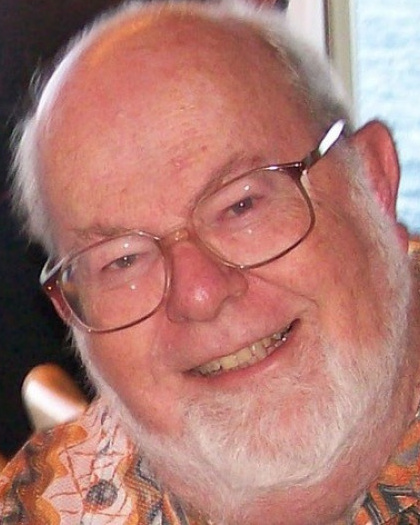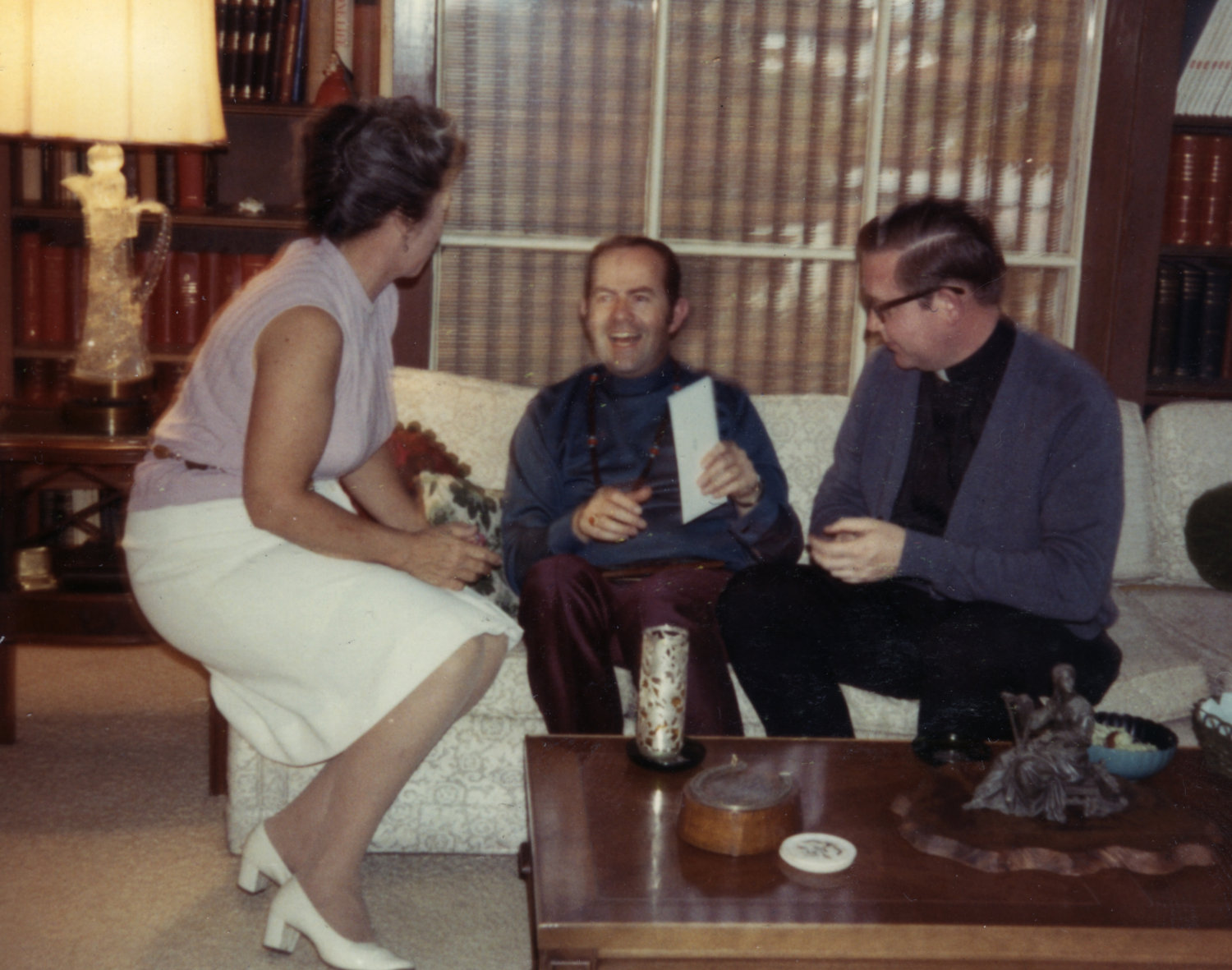
Pax Nidorf
Biography
Patrick Xavier Nidorf, born Pinchus Patrick and later known as Pax Nidorf, founded the LGBTQ Catholic organization Dignity in 1969. Nidorf was born on March 25, 1932 in Phoenix, Arizona, to Louis Xavier and Mary Hattie Nidorf. His artistic abilities were evident from an early age—“I was a painter from the womb”—and were encouraged by his parents. In his early years, he trained in painting as well as other educational endeavors.
He attended school at Sacred Heart Academy in Klamath Falls, Oregon, and Villanova Preparatory School in Ojai, California. In 1951, he entered the Augustinian novitiate in New Hamburg, New York. He also studied at Villanova University in Philadelphia from which he received a bachelors degree in 1956. He did graduate studies jointly at the Augustinian college at Catholic University of America and at Villanova, where he studied adolescent psychology. He received graduate degrees in 1960 and was ordained a priest on May 31, 1960, by Bishop Francis Buddy in San Diego, California. He continued his artistic work and spent a year after his ordination studying art in Philadelphia. Fr. Nidorf became a teacher at St. Augustine High School, an all-boys private school in the Augustinian tradition, in San Diego. Along with a full workload of teaching, counseling students and parish work on the weekends, he also continued painting, presenting an exhibit of his surrealistic paintings at the University of San Diego College for Men Library in May 1969.
In the course of his ministry and teaching, Fr. Nidorf encountered a number of homosexual persons. “The Catholic gay people whom I had met were frequently bothered by ethical problems and identity with the Church. It seemed obvious that the Church was not meeting the needs of the gay community. In counseling gay Catholics, there always seemed to be an excessive and unreal problem of guilt that was sometimes reinforced in the confessional instead of being resolved.”
Feeling a need to act on his observations, in early 1969 Fr. Nidorf drafted a paper proposing the creation of a support group for gay Catholics and presented it to a provincial meeting. A number of priests supported his proposal and encouraged him to begin such a ministry. Fr. Nidorf decided to call this support group Dignity: “the name Dignity just came to me as appropriate one of our basic goals was to bring dignity into the spiritual and social lives of very special people.”
Fr. Nidorf spread the word through networks of persons he had encountered and the group initially met in homes. Nidorf also placed classified ads in LGBTQ-friendly periodicals like the Los Angeles Free Press and The Advocate. A 1970 Advocate ad read: “Catholic Gays: Join DIGNITY, a Catholic group of intelligent gay men and women. We share successful ways of bringing dignity into our lives. Honest talk/sensitivity/sincere people. Applicants screened. Write: Fr. Pat, Box 4486, N. Park St., San Diego, CA 92104.” Nidorf wanted to ensure that the group would be a safe place for persons who faced possible persecution. So he asked that interested persons be 21 years of age, complete an application, pay a $5.00 fee and be interviewed before they came to a meeting.
The response to Fr. Nidorf’s outreach was strong; he reportedly received 168 responses to one ad. The group met monthly in homes. Nidorf relocated to Los Angeles and started a newsletter in February 1970 to communicate meeting times and location and the topics of conversation. In May 1970, he asked Bob Fournier to a draft a mission statement and organizational papers and the next month he appointed Fournier as General Chairman of Dignity. Dignity’s first meeting on church property was in the basement of St. Brendan’s Parish in Los Angeles in September 1970.
The Dignity group grew quickly and in early 1971, the members urged Fr. Nidorf to request recognition from the Los Angeles Diocese. Unsure that this was a wise move, Nidorf proceeded to send a letter to the diocese. On February 11, 1971, he was called before the archbishop who stated his determination that Nidorf was working in his diocese without permission. Furthermore, the archbishop found that Dignity’s principles were not consistent with Catholic teaching and ordered Nidorf to disassociate himself from the group. Fr. Nidorf complied, and on February 20, 1971, he announced his resignation. The Dignity group—numbering about 90 persons at that time—decided to continue its work as a lay-led organization under the leadership of Fournier.
Nidorf retired from the priesthood in 1973 and married Dacia St. John, with whom he lived until her death in 1999. He began a private practice as a psychotherapist which he pursued alongside his creative, artistic ventures. While he was an accomplished painter, illustrator, potter and craftsman, Nidorf’s first love was painting. He displayed his work at many one-person shows in the western U.S. over the following years and occasionally had collaborative exhibits with his brother Luis, a sculptor and digital photographer. He also wrote several books of physic and spiritual insights, including Beyond Dreaming: Tools for Psychic Development (January 1979).
Nidorf has been invited to address several Dignity gatherings over the years. In his 2012 keynote address to Dignity Los Angeles, Nidorf said:
So it is important for you to know that it was only by some strange cosmic lottery that I was chosen to plant the first seeds of Dignity. The Spirit tapped me on the shoulder and I happened to listen. After planting those seeds, He inspired others, far more talented and brilliant than I am, to carry on His work; and thus Dignity has grown through tremendous and untiring efforts.
I envision Dignity as being a great presence and force for goodness in the world. It goes way beyond sexual preference and all of the way to the very core of humanity. When someone knows that you are a member of Dignity, they should automatically assume that you are a symbol for everything that is good and just in this world.
Pax Nidorf died on March 27, 2023, at his home outside San Diego, a few days after his 91st birthday.
(This biographical statement written by Mark Bowman from these sources:
https://dignityusa.org/civicrm/mailing/view?id=2588&reset=1
https://wikisummaries.org/gay-catholics-find-dignity/
https://oac.cdlib.org/findaid/ark:/13030/kt638nd4bn/
https://www.sandiegouniontribune.com/sdut-catholics-extraordinary-synod-gays-2014oct18-htmlstory.html
https://digital.sandiego.edu/cgi/viewcontent.cgi?article=1185&context=newsreleases
https://www.artpal.com/paxnidorf )
Biography Date: April 2023
Additional Resources
An interview with Pax Nidorf about the founding of Dignity.
This article from The Catholic Sentinel on June 23, 1960, reports Nidorf's ordination.
Tags
Catholic (Roman) | Clergy Activist | Artist/musician/poet | Dignity | San Diego | California
Citation
“Pax Nidorf | Profile”, LGBTQ Religious Archives Network, accessed February 23, 2026, https://lgbtqreligiousarchives.org/profiles/pax-nidorf.
Remembrances
“I was a child attending grade school at Our Mother of Good Counsel Parish in Hollywood when my mother, Doris Castañares became a friend of Father Pat Nidorf. He often visited our house and was a wonderful adult to know. At the time he was doing beautiful ceramic art and gifted our family with a unique nativity set as a creche. I am including a picture of him with my mother to the left and another priest friend, the late Father Tom Beehan OSA on the right, taken probably in the late 1960s at my family's home.
 My mom made me aware of Dignity at an early age, and of Father Pat's visionary leadership of it. They remained friends, but drifted out of touch for a few years in the 1990s. When my mother came to live with my husband and me in the early 2000s in Oregon, she and I looked up Pax -- she knew he had changed his name and left the priesthood – – and we found him on Facebook. She and Pax resumed their friendship by email and were great pen pals. Pax sent handmade greeting cards for just about every holiday, and lots of emails with jokes, some of his paintings, interesting photos and articles.
My mom made me aware of Dignity at an early age, and of Father Pat's visionary leadership of it. They remained friends, but drifted out of touch for a few years in the 1990s. When my mother came to live with my husband and me in the early 2000s in Oregon, she and I looked up Pax -- she knew he had changed his name and left the priesthood – – and we found him on Facebook. She and Pax resumed their friendship by email and were great pen pals. Pax sent handmade greeting cards for just about every holiday, and lots of emails with jokes, some of his paintings, interesting photos and articles.
I still have some ceramic items he made. When my mom died at age 98 in 2019, I became the pen pal, and was honored to be that. Pax and I corresponded a lot, and my husband Pablo and I became the recipients of those wonderful handmade cards, sometimes bejeweled, sometimes with jokes, often with pop-ups. He also kept me informed about his brother Louie, his granddaughter Heather and other relatives, as well as about the cats that Louie and he adopted, Louie's death and Pax's move to Assisted Living, and more. His paintings remained mystical, sensuous, free.
I will miss him. He influenced my life and my mother's, in all the best ways.”
– as remembered by Tina Castañares on April 27, 2023
Know Pax Nidorf? Tell us your experience.
(All entries are reviewed by the LGBT-RAN office before posting.)